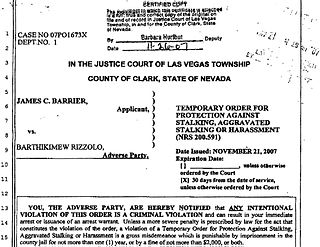Related Research Articles

A restraining order or protective order, abbreviated PFA, is an order used by a court to protect a person, object, business, company, state, country, establishment, or entity, and the general public, in a situation involving alleged domestic violence, child abuse, assault, harassment, stalking, or sexual assault. In the United States, every state has some form of domestic violence restraining order law, and many states also have specific restraining order laws for stalking and sexual assault.
A proportion of victims of rape or other sexual violence incidents are male. Historically, rape was thought to be, and defined as, a crime committed solely against females. This belief is still held in some parts of the world, but rape of males is now commonly criminalized and has been subject to more discussion than in the past.
Abuse is the improper usage or treatment of a thing, often to unfairly or improperly gain benefit. Abuse can come in many forms, such as: physical or verbal maltreatment, injury, assault, violation, rape, unjust practices, crimes, or other types of aggression. To these descriptions, one can also add the Kantian notion of the wrongness of using another human being as means to an end rather than as ends in themselves. Some sources describe abuse as "socially constructed", which means there may be more or less recognition of the suffering of a victim at different times and societies.
Psychological abuse, often called emotional abuse, is a form of abuse characterized by a person subjecting or exposing another person to a behaviour that may result in psychological trauma, including anxiety, chronic depression, or post-traumatic stress disorder. It is often associated with situations of power imbalance in abusive relationships, and may include bullying, gaslighting, and abuse in the workplace. It also may be perpetrated by persons conducting torture, other violence, acute or prolonged human rights abuse, particularly without legal redress such as detention without trial, false accusations, false convictions, and extreme defamation such as where perpetrated by state and media.

A sham marriage or fake marriage is a marriage of convenience entered into without intending to create a real marital relationship. This is usually for the purpose of gaining an advantage from the marriage.
Various individuals, courts and the media around the world have raised concerns about the manner in which cases of child sexual abuse are handled when they occur in congregations of Jehovah's Witnesses. An independent 2009 study in Norway was critical of how Jehovah's Witnesses dealt with cases of child sexual abuse but stated there is no indication that the rate of sexual abuse among Jehovah's Witnesses is higher than found in general society. The organization officially "abhors" child sexual abuse, and states "the incidence of this crime among Jehovah's Witnesses is rare."

Human trafficking and the prostitution of children is a significant issue in the Philippines, often controlled by organized crime syndicates. Human trafficking is a crime against humanity.
Pedophilia is a psychiatric disorder in which an adult or older adolescent experiences a primary or exclusive sexual attraction to prepubescent children. Although girls typically begin the process of puberty at age 10 or 11, and boys at age 11 or 12, criteria for pedophilia extend the cut-off point for prepubescence to age 13. A person must be at least 16 years old, and at least five years older than the prepubescent child, for the attraction to be diagnosed as pedophilia.
Sexual abuse or sex abuse, also referred to as molestation, is abusive sexual behavior by one person upon another. It is often perpetrated using force or by taking advantage of another. When force is immediate, of short duration, or infrequent, it is called sexual assault. The offender is referred to as a sexual abuser or molester. The term also covers any behavior by an adult or older adolescent towards a child to stimulate any of the involved sexually. The use of a child, or other individuals younger than the age of consent, for sexual stimulation is referred to as child sexual abuse or statutory rape. Live streaming sexual abuse involves trafficking and coerced sexual acts and or rape in real time on webcam.
Domestic violence occurs across the world, in various cultures, and affects people across society, at all levels of economic status; however, indicators of lower socioeconomic status have been shown to be risk factors for higher levels of domestic violence in several studies. In the United States, according to the Bureau of Justice Statistics in 1995, women reported a six times greater rate of intimate partner violence than men. However, studies have found that men are much less likely to report victimization in these situations.

Domestic violence is violence or other abuse that occurs in a domestic setting, such as in a marriage or cohabitation. Domestic violence is often used as a synonym for intimate partner violence, which is committed by one of the people in an intimate relationship against the other person, and can take place in either heterosexual or same-sex relationships or between former spouses or partners. In its broadest sense, domestic violence also involves violence against children, parents, or the elderly. It can assume multiple forms, including physical, verbal, emotional, economic, religious, reproductive, or sexual abuse. It can range from subtle, coercive forms to marital rape and other violent physical abuse, such as choking, beating, female genital mutilation, and acid throwing that may result in disfigurement or death, and includes the use of technology to harass, control, monitor, stalk or hack. Domestic murder includes stoning, bride burning, honor killing, and dowry death, which sometimes involves non-cohabitating family members.

Women in Malaysia receive support from the Malaysian government concerning their rights to advance, to make decisions, to health, education and social welfare, and to the removal of legal obstacles. The Malaysian government has ensured these factors through the establishment of Ministry of National Unity and Social Development in 1997. This was followed by the formation of the Women's Affairs Ministry in 2001 to recognise the roles and contributions of Malaysian women.

Domestic violence in United States is a form of violence that occurs within a domestic relationship. Although domestic violence often occurs between partners in the context of an intimate relationship, it may also describe other household violence, such as violence against a child, by a child against a parent or violence between siblings in the same household. It is recognized as an important social problem by governmental and non-governmental agencies, and various Violence Against Women Acts have been passed by the US Congress in an attempt to stem this tide.
The following outline is provided as an overview of and topical guide to domestic violence:

A Domestic Abuse Restraining Order (DARO) is a form of restraining order or order of protection used under the domestic abuse laws of the state of Wisconsin and enforceable nationwide under invocation of the Full Faith and Credit Clause in the Violence Against Women Act. It is a legal intervention in which one person who is deemed to be hurting, threatening or stalking another person is ordered to stop—and often cease all direct and indirect contact—with the goal of reducing risk of further threat or harm to the petitioner. The petitioner and respondent will generally be in certain specific relationships such as a spousal or sexual relationship. If the petitioner is in an unwanted stalking relationship with the respondent, however, a closely related form of injunction, a Harassment Restraining Order (HRO) may be more appropriate.
Abusive power and control is commonly used by an abusive person to gain and maintain power and control over another person in order to subject that victim to psychological, physical, mental, sexual, or financial abuse. The abuser may have a variety of motivations which can include devaluation, envy, personal gain, personal gratification, psychological projection, or simply the enjoyment of exercising power and control.
Domestic violence is prominent in Nigeria as in many parts of Africa. There is a deep cultural belief in Nigeria that it is socially acceptable to hit a woman to discipline a spouse. Cases of Domestic violence is on the high and shows no signs of reduction in Nigeria, regardless of the age, tribe, religion or even social status. The CLEEN Foundation reports 1 in every 3 respondents admitting to being a victim of domestic violence. The survey also found a nationwide increase in domestic violence in the past 3 years from 21% in 2011 to 30% in 2013. A CLEEN Foundation's 2012 National Crime and Safety Survey demonstrated that 31% of the national sample confessed to being victims of domestic violence.
An Occupation Order is a type of injunction in English law. It is one of two types of injunction available under the Family Law Act 1996, the other being a non-molestation order. An Occupation Order is used to regulate who can live in the family home.
Domestic violence in the United Kingdom is a criminal offence. Domestic violence or abuse can be physical, psychological, sexual, financial or emotional. In UK laws and legislation, the term "domestic abuse" is commonly used to encompass various forms of domestic violence.

The Domestic Abuse Act 2021 is an act of Parliament in the United Kingdom. This Act was used to ratify the Istanbul Convention; however much of the content within the Act is still much debated. There have been calls to tackle domestic violence in the United Kingdom, which has been referred to as a "silent epidemic." The Act is intended to help tackle domestic abuse in the UK. There have been numerous suggestions to address the Act's protection of victims of domestic violence. The UK has also received criticism for taking eight years to carry out commitments following the Istanbul Convention.
References
- ↑ "Non-Molestation Orders | Domestic Violence | Simpson Millar Solicitors". Simpsonmillar.co.uk. 27 November 2007. Retrieved 20 June 2015.
- 1 2 "Women's Aid - The Survivor's Handbook - Getting an injunction". Womensaid.org.uk. 1 July 2007. Retrieved 20 June 2015.